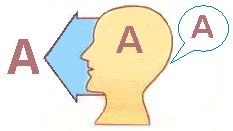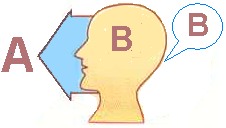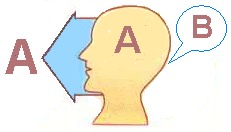Reliable Witness

Evidence is A
Perceives A
Testifies A
Mistaken Witness

Evidence is A
Perceives B
Testifies B
False Witness - a Liar

Evidence is A
Perceives A
Testifies B
The universe is a field of all possibilities. Any possibility can be the subject of a false accusation. Evidence is the key to determining in the Court room what "could have happened" from "what did happen." Defendants should only be sentenced for what actually happened.
Evidence can be of two types: Subjective and Objective. Subjective evidence is the testimony of what happened based on the statements of a witness, or Subject. The quality of the subjective evidence depends upon the honesty of the witness, and their ability to perceive reality. Unfortunately, subjective views are often inconsistent and biased. People may see what they want to see, or what they expect to see. Often, witnesses of the same traffic accident will report contradictory stories. People also may lie.
Subjective evidence should only be used to elaborate upon Objective evidence. "Subjective evidence" is not evidence at all, and can never stand alone, without Objective evidence. "Subjective evidence" is a contradiction of terms, which has somehow become part of our vocabulary. It is only the report of what some person or Subject has allegedly seen, heard, touched, tasted, or smelled. It is relying on someone else's senses, and truthfulness in reporting what was sensed.. The judge and jury is totally dependent upon the reliability of the Subject, in the absence of any Object of perception in the Court room.
Objective evidence is truly deserving of the word "evidence." Objective evidence does not lie. The interpretation of Objective evidence may vary, and that is the purpose of a court room discussion - What can we infer from the objects. Objects are the objects of perception, things that can be seen, heard, touched, tasted, or smelled. They include videos, pictures, fingerprints, DNA, foot prints, tire tracks, tape recordings, phone calls, physical objects, liquids, and gases. Recently, objective evidence can include electronic information, such as emails or files on a computer.
Objective evidence does not change, as long as it is not tampered with. It is what it is. It is unbiased. It has no motives. It has no feelings. It does not care what the outcome of the court trial is. It simply speaks the truth.
There was no Objective evidence offered at William Martinez' trial. Objective evidence takes more effort. It must be retrieved, stored, protected, recorded, and presented. Subjective testimony is easier - just put the witness on the stand and ask some questions. But, if all Courts would remember to return to be based on Objective evidence, there would be far fewer falsely convicted people, and more justice.
|
Reliable Witness |
Mistaken Witness |
False Witness - a Liar |
The judge and jury must evaluate the Knower (Subject), his or her ability to Know (consciousness, intelligence, awareness, ability to perceive reality), and Truthfulness (willingness or ability to accurately convey what was perceived to the best of their ability). But if the judge and jury can perceive the Object or Known (the A) themselves, right in the Court room, then they are much closer to the truth as it appears to them.
The subjective "evidence" the Drug Enforcement Agency (DEA) had was the word of the caught drug smugglers who named him as the king pin, in exchange for reduced sentences. The real king pin was Otto who escaped from a jail in Mexico and has a $5 million dollar reward on his head. The Government kept William Martinez without a formal charge for years as they gathered evidence. The evidence should have been gathered first, before ruining